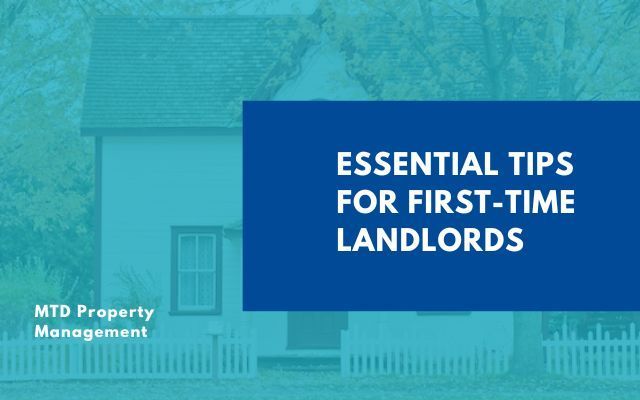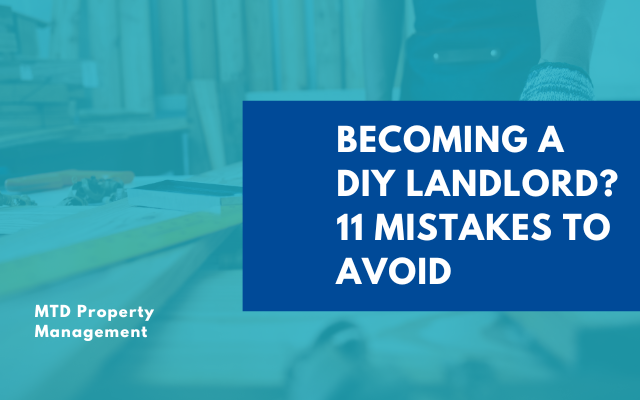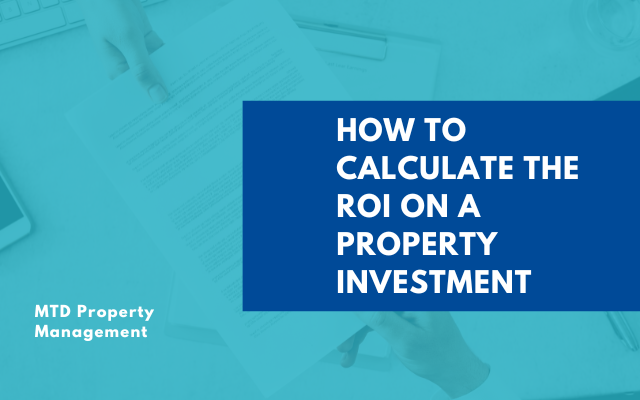Essential Tips for First-Time Landlords

Being a first-time landlord can be overwhelming. From finding tenants to understanding the legal landscape of being a landlord, there’s a lot to learn to make sure your rental business is successful.
MTD Property Management is here to help with some essential tips for first-time landlords. With our guidance, you’ll be able to create a successful rental property business that thrives. Whether you’re renting out a single-family home or an entire apartment building, these tips can help you succeed.
Research the Local Market
Before becoming a landlord, it’s important to research the local rental market, understand landlord-tenant laws, and learn about the different types of rental properties and their
associated costs.
Knowing the local competition will help you determine a competitive rental rate and an acceptable tenant screening process. Familiarizing yourself with the law will help you remain compliant and avoid potential legal issues down the road.
Screen Tenants Carefully
Regardless of the type of rental property you own, you will need to screen prospective tenants carefully. This includes running a credit and background check, verifying income and references, and interviewing potential tenants.
If you don't already have a screening process in place, consider reaching out to a property management company for help. MTD Property Management will help you create a comprehensive screening process for your tenants. Our services include online applications, credit and background checks, and tenant verifications.

Price the Rental Property Competitively
Setting a competitive rental rate is crucial to attract tenants and make sure you’re maximizing your rental income. Research
rental rates in your area and be sure to factor in costs such as taxes, insurance, and maintenance before
pricing your Chicago home to rent.
Create a Written Rental Agreement
A written rental agreement is essential to protect yourself, your investment, and your tenant. It should outline the terms of the lease and the rights and responsibilities of each party, as well as the consequences for violating the agreement.
The lease should outline the security deposit amount, how it will be used, and when it will be returned. Additionally, the agreement should include the rent amount, when and how it should be paid, and any late fees that may apply. It should also cover any necessary repairs and maintenance, and who is responsible for them, as well as any additional agreed-upon terms, such as whether the tenant may
paint the property.
Schedule Regular Maintenance
As a landlord, you’re responsible for keeping your rental property in good condition. Perform regular maintenance and repairs to ensure the property meets the required health and
safety standards.
Build a network of reliable contractors, such as plumbers and electricians, you can rely on for regular maintenance and/or emergencies. Be sure to document all repairs and maintenance, including the date, cost, and any materials used. This will help you keep track of the property’s upkeep and establish proof of maintenance, should you need it in the future.

Establish a Rent Collection System
Establishing a system for collecting rent is vital to your business’ success. Start by deciding when rent is due and how it should be paid, then set a policy for late payments and determine when to take legal action if it comes to that.
You may want to consider setting up an automatic rent payment system to reduce the amount of manual work you have to do. Such a system can also help keep track of payments and send out reminders to tenants if necessary.
Manage Tenant Complaints
As a
landlord, you need to respond to
tenant complaints and maintenance requests in a timely manner. You may want to develop a system for handling tenant disputes and be prepared to mediate if necessary.
Having a good system in place can help ensure that tenant complaints are handled quickly and efficiently. You should also have a clear policy stating how complaints will be addressed and what kind of response tenants should expect from you.
Make sure tenants are aware of the process for submitting complaints and know how to reach you in case of an emergency.
Comply with Landlord-Tenant Laws
Each state has its own set of landlord-tenant laws that landlords and tenants must abide by. These laws cover topics such as security deposits, tenant rights, and evictions. Make sure to familiarize yourself with Illinois landlord-tenant laws.

Landlords should ensure their lease complies with the state’s legislations and remove any terms that conflict with the law. Before signing, landlords should review the lease with the tenant to ensure both parties understand the agreement. Landlords should also keep a copy of the signed lease for their records.
Take Advantage of Tax Deductions
As a landlord, you can take advantage of tax deductions for rental property expenses, such as maintenance and repairs, mortgage interest, insurance, and more. Keeping records of these expenses is essential for filing taxes accurately. Doing so can help lower your overall tax liability and potentially increase your return.
Invest in Property Insurance
Property insurance can help protect yourself from potential losses due to tenant damage, theft, or liability. Compare different policies to find one that fits your needs and budget.
It’s also recommended you invest in
liability insurance to protect yourself in the event that a tenant or visitor gets injured on your property. This type of insurance can cover medical costs and legal fees, potentially saving you significant amounts of money in the long run.
Finally, if you have multiple properties, consider purchasing a master policy that covers all of them. This can be a cost-effective way to ensure your investments are well-protected.

Summary
Being a first-time landlord is both exciting and daunting. However, with the right information, preparation, and planning, you can build a very successful business.
If you need additional help managing your rental properties, consider working with
MTD Property Management. Using our years of knowledge and experience in the field, MTD Property Management can help you provide a safe and comfortable home for tenants while increasing your profits. Contact us today for more information!









